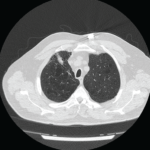Yet her picture didn’t fit. She lacked a fever. Her white cell counts looked fine, but her red cell count had plummeted from its normal level just a few weeks earlier. Her renal function had deteriorated, as evidenced by a rising serum creatinine and a urinalysis that demonstrated proteinuria and red cell casts. This was not an infection, nor was this due to RA.
Maybe it was vasculitis? Certainly her lung findings were highly suggestive of pulmonary hemorrhage. Days later, with the arrival of a positive antinuclear cytoplasmic antibody (ANCA) test result, it was assumed that she was suffering from a systemic vasculitis affecting her lungs and kidneys.
Besides being one of the most critical medical diagnoses, pulmonary hemorrhage had an especially frightening impact on Holly. Not only had her baby sister died of a mysterious lung disease 30 years earlier at age 4, but her older sister had succumbed to respiratory failure a year prior to this admission. And her late sister’s 12-year-old daughter was currently being treated with immunosuppressive therapies for her own progressively worsening lung disease.
A Chance Mutation
Around the time of Holly’s admission, a similar story was being played out a few thousand miles away in San Francisco. Anthony Shum, MD, an assistant professor of medicine at the University of California, San Francisco (UCSF) heard of a woman admitted to the emergency department at UCSF with pulmonary hemorrhage (see “A New Syndrome of Autoimmunity,” The Rheumatologist, June 2015).
After visiting the patient’s mother at her bedside, he learned that a distant cousin had a 2-and-a-half-year-old daughter under treatment for pulmonary hemorrhage at a nearby hospital. The mother did not hear about the sickness directly from family members; instead, she heard about it via mutual Facebook friends. Welcome to modern life! Some careful sleuthing uncovered another distant relative with similar symptoms. Reaching out to colleagues at the Texas Medical Center in Houston, they identified a group of 20 affected individuals in five unrelated families who appeared to have a Mendelian syndrome of autoimmunity characterized by high-titer autoantibodies, including ANA, RF and ANCA, an inflammatory arthritis resembling RA, pulmonary hemorrhage or interstitial lung disease and in select patients, features of autoimmune renal disease.4
Using whole exome sequencing techniques, the investigators identified four unique deleterious variants in the ubiquitously expressed coat protein gene, COPA, a resident chaperone in the endoplasmic reticulum. These COPA variants impaired binding to proteins targeted for retrograde transport from the Golgi apparatus to the endoplasmic reticulum.


